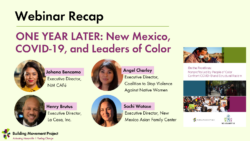Mar
23
2021
Quick Access: Recording, Transcript, On the Frontlines Report
Last Tuesday, the Building Movement Project hosted a webinar with four nonprofit leaders of color in New Mexico on how the COVID-19 pandemic continues to impact their work and their communities. We heard from Angel Charley of Coalition to Stop Violence Against Native Women, Henry Brutus of La Casa, Inc., Johana Bencomo of NM CAFé, and Sachi Watase of New Mexico Asian Family Center.
Later that evening, news broke of eight people, six of them Asian women, who were murdered by one white man in shootings at three different spas in Atlanta, Georgia. Anti-Asian racism has been on the rise since the start of this pandemic, and the shootings in Atlanta are further proof of the violence, trauma, and grief that the AAPI community experiences as a result.
During our webinar, Sachi Watase shared some of the barriers that Asian individuals and communities in New Mexico face when reporting acts of race-based violence. She identified taboos around coming forward for help; mistrust in established processes and systems; as well as misinformation and a lack of accessible information translated into languages spoken by community members. Sachi also highlighted a familiar dynamic that faces many communities of color: priority and survival. She remarked that, for the community members her organization serves, it is often a choice between reporting a hate crime and putting food on the table.
These challenges have been exacerbated by the pandemic and are impacting all communities of color. Henry Brutus reflected on how the New Mexico State Department of Health has been reporting lower vaccination rates among Black and Latinx communities, which is a startling finding given that New Mexico is a majority-POC state. He emphasized the need to dispel myths and address mistrust in Black and Latinx communities, while Johana Bencomo argued that the disproportionate rates of infection and vaccination in Latinx communities are more likely tied to issues of information access and language barriers. She challenged the idea that people of color and immigrants are more hesitant of vaccines, proposing instead that the real issue is a lack of culturally and linguistically appropriate information. Returning to the importance of trust, Johana urged government actors to turn to the leadership of community-based nonprofits who already have the trust of their constituents. Angel Charley echoed the importance of these groups, adding that staff working in community-based nonprofits “live our mission – we are the populations we serve.”
All four leaders reflected on the difficulty of decision-making and leading in the past year. Angel identified “decision fatigue” as a persistent feeling alongside the many other experiences of leading during a pandemic. Henry agreed, adding that given the changing nature of each day, leadership in this moment involves making decisions on the fly, facing new challenges, pivoting, adapting, and learning alongside everyone else.
To close out the discussion and address the impact of the past year, Angel noted that amidst all of the loss and trauma, many folks haven’t been afforded the space and time to grieve properly, if at all. She urged us to consider: “How are we prioritizing time to rest, process, and reflect? And to honor and celebrate the ways we have shown up in this past moment?”
Watch the full webinar recording to hear more about what New Mexico nonprofits need in this moment, how funders and the sector can support leaders of color, and solidarity across movements in the wake of COVID-19.

